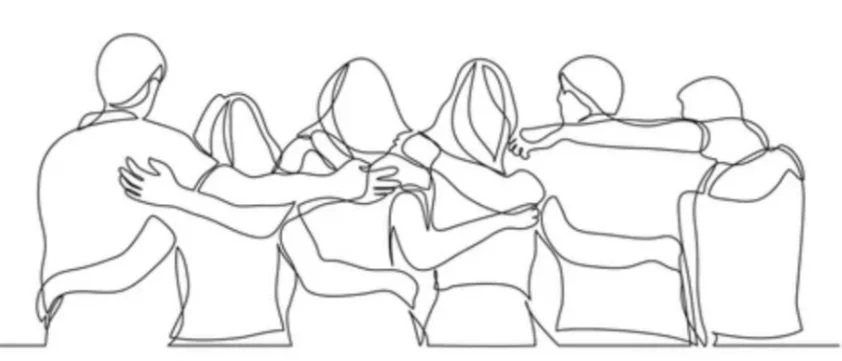The Philosophy of Friendship: Maker or Breaker of a Good Life?
All around us, reverberated to nearly infinite extents, is the value of friendship: the spice of life obtained by going out for a drink with co-workers, study sessions with close classmates, and wandering expanses of shopping malls with friends. For many it forms a support structure in the worst of times, but for others, the uncertainties and falling-outs of friendship often contribute to the worst of times. This begs the question: do people truly need friendship? Is friendship necessary for a good life, or potentially a poison amongst the crowd?
Defining Friendship
To begin, the term “friendship” must be defined. Under Aristotle, there were three general types: utility, pleasure, and good. Friendships of utility, quite straightforwardly, were relationships as a means to an end. It functioned off the predominant intention of mutual benefit; take the examples of co-workers or industry/social connections. Friendships of pleasure took a hedonistic stance; these were relationships centralizing upon sensation-based fun, such as “clubbing buddies''. Finally, perhaps most widely known, friendships of good were what we most often envision when encountering the concept of “friends”; this manifested in relationships of mutual respect, admiration for one anothers’ virtues, and a desire to help each other whenever possible. Epicurus, another ancient Greek philosopher, possessed views of the sort as well– defining friendships to be trust-based, filled with generosity, and co-learning from mutual experiences. Inevitably, the three do not come in discrete, quantitative packages. Overlap is common, such as co-workers with whom you go to the bar after a 9-to-5, or classmates in which one’s virtues simply clicks with another. Yet regardless of the variety of friendships that exist, the most powerful bonds exist as a fusion of all three; that is, intimate friends who are reliable in any scenario, who mutually aid each other not simply during darkest times but in all aspects of life, and all while having the best of times together. So to what extent does one truly need such a bond, or any one of the three types, to fulfill a good life?
To the scholar C.S. Lewis, the answer was quite simple– “Friendship is unnecessary, like philosophy, like art,… It has no survival value; rather it is one of those things which give value to survival.” And largely, this stands correct. A few days, a week, a year without friends fails to impose the peril that a day without food or water would. Rather, in Lewis’ lens, friendship forms an additive to the survival that essentials such as food and water do bring; the benefits comprise an additional layer to the bare minimum of life. Objectively, it seems then, that the answer to friendship’s role in a good life is startlingly simple; must one not gain the best friendships possible to lather as many layers of this “additive” as possible? Media and culture of our society, especially amongst younger generations, reflect this as well; quantitatively, the concept of popularity, the amount of friendships or connections one has, is especially celebrated in facets such as social media or high school drama tropes, and qualitatively, societal narratives constantly declare quality to be substantially more significant than quantity, even in realms outside of friendships.
However, this largely classifies friendship into a false dichotomy; that having fewer friends immediately equates to them being of quality, and having many friends equates to being surface-level. Although situations tend to emerge in this pattern, the spectrum on which friendship exists, rather than a scale, resembles moreso a Cartesian plane: not just an x-axis, but an x- and y-axis together. Oftentimes, there are caveats, exceptions, and vulnerabilities even in having fewer friends, even if such friends are of “high quality”.
Quantity of Friendships
Firstly, what causes friendships to be shallow? Many would respond that higher quantities correlate with lack of meaningful friendships– and this certainly may be the case! However, the primary cause for surface-level friendships, although differing in individual cases, tend to be the lack of a cumulation of Aristotle’s three types of friendships. Shallowness occurs when perhaps a person does not value another person as much, or has little to talk about, or have friends of higher priority; notably, this occurs when one is merely “friends” with another for homework answers, or only talks to another for party invites, or even in the most seemingly infallible case of friendships of good, one only reaches out to another to find emotional release following certain events. Note, then, how this is uniquely disparate from the concept of having a high numerical amount of friends; one can have few friends who, due to not encapsulating all three of Aristotle’s friendship types, are shallow in quality as well. Although the case of shallow friends is oftentimes concurrent with a higher number of friends, simply due to the bustle of peoples’ lives requiring them to meet many others, it is not mutually exclusive with having fewer friends. Furthermore, having shallow friends in and of itself does not actively make a life bad; “shallow” friends bring much utility, joy, and comfort, especially in congregation. Although not necessary for a good life, more distanced friends are not inherently harmful. In what respect, then, is friendship able to have a substantial contribution to life? If all of friendship’s impacts on a good life is marginal at best, is it truly necessary?
Quality of Friendships
Let us, secondly, discuss the contributors to quality friendships. Quality friendships, unlike more distanced friendships, are capable of bestowing more goodness upon a life; as social creatures down to the bone, to laugh and cry with someone on an intimate level substantially grants more meaning to our lives– this is the same premise upon which people revere romantic relationships so intensely, as well. The benefits of a quality friendship seem insurmountably high, and unrejectable– so how, then, does one achieve this?
General societal culture would believe having fewer friends equates to quality– as spending more time with less people surely results in richer friendships! There are caveats, however, that the idealistic movie portrayals and blogs would neglect to show the world. Although quality friendships bring much goodness to life, this is the precise reason humans so carnally desire them– and this results in the fatal flaw of dependency. When a person perhaps finds another to be platonically attractive, they place them in a position of priority in their mind. They tend to gravitate more towards them, especially if they have few alternative friends. This is not to say they are not of quality; rather, this aims to illustrate the issues that arise with quality friends. It is easy for one to forget that friendships are not, can rarely, be a perfect two-way exchange. When dependency forms, tensions arise when one is riddled with insecurity, with agony over if they are placed in the same position of high priority to the other person as they so dutifully have with them. When one has fewer friends, the crucial issue is the vulnerability they impose onto themselves; the tradeoff of higher quality corresponds to more anxiety, more control another person has over one, and less independence. Note that these things are generally negative, meaning “quality” friends do have the potential to act as a detriment to a good life. Rather than being omnipotently “good” concepts, the truth is more grey than black and white.
At the end of the day, neither a quantity of friends or quality friends are inherently negative or positive in relation to a good life. Both possess the capacity to be incredibly beneficial and enrich a life, and simultaneously to cause heartache and disconnect. Its ability to both make or break a good life allows us to conclude one central thing: rather than a one-size-fits-all prescription for the recommended number of friends, the sole thing that matters in the long run for a good life is friends who help a person be stable. Happiness, utility, comfort, can absolutely (and oftentimes do) contribute to stability, but are not the definitive and only ingredients to a recipe that varies for each person– one holds the reins to their own life, and a good life is fulfillable by any amount of friends.
Sources:
https://einzelganger.co/the-social-minimalist-can-we-be-happy-without-friends/
https://philosophynow.org/issues/126/Aristotle_on_Forming_Friendships



